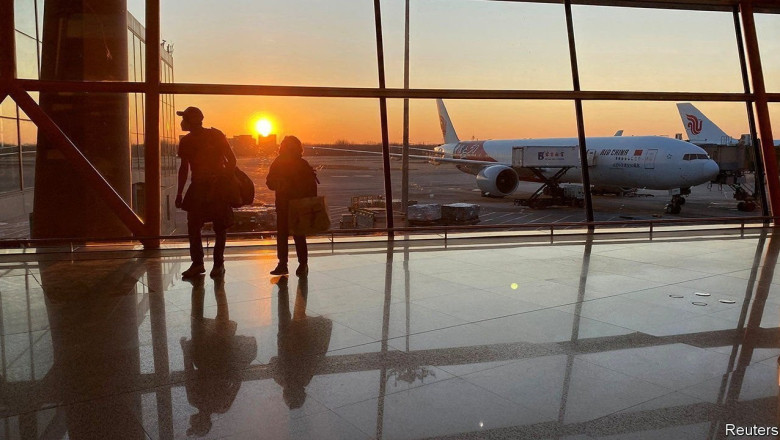element.Save time by listening to our audio articles as you multitaskOK
Most of Shanghai’s 25m residents have been locked in their homes for more than a month in order to stem an outbreak of covid-19 in the city. Case numbers are dropping there, but rising in Beijing, the capital, which is doing mass testing and imposing targeted lockdowns. Business leaders worry about the economic impact of China’s covid controls. Many foreigners are leaving—and, according to online search trends, China’s young and educated elite are thinking about doing the same.
On WeChat, a popular messaging app, searches for “immigration” increased more than fourfold between early and mid-April. Users of Weibo, China’s version of Twitter, published more than 78,000 posts with the run character in March and April (see chart). Spikes in their frequency coincided with traumatic events in Shanghai, such as when an asthma patient was refused medical treatment and died, or when videos of infected children separated from their parents spread online.
“It’s like an alarm bell has gone off,” says Miranda Wang, a young Chinese video-producer who moved to Shanghai after studying in Britain. The Chinese metropolis used to feel like a global city, similar to London, she says. But after more than 50 days of lockdown, Ms Wang has begun researching ways to leave. “Now we realise, Shanghai is still China’s Shanghai,” she says. “No matter how much money, education or international access you have, you cannot escape the authorities.”
Chinese internet users have crowdsourced a repository of run-philosophy readings on GitHub, a platform for open-source coding and rare refuge from censorship in China. There they discuss why to run, where to run and how to run, archiving stories of successful emigration to various countries. To run is not to seek pleasure or profit, one essay states, but to escape a country that is speeding in the wrong direction. “Surely a sheep that has been hurt by beating can try to flee?” it asks. “Therein lies the truth of run.”
But to run is easier said than done. Flights out of China are few and expensive. America has tightened visa restrictions on Chinese students over exaggerated fears of spying. In the name of pandemic prevention, China is also making it harder for citizens to move around. Since 2020 the National Immigration Administration has stopped issuing travel documents for “non-essential reasons”. The agency handed out 335,000 passports in the first half of 2021, only 2% of the number issued over the same period in 2019. The authorities in one city, Leiyang, have been confiscating citizens’ passports to prevent travel. “We’ll return them after the pandemic is over,” says a public-security official.
Would-be emigrants know that they are in the minority. A young finance worker in Beijing says her peers “see no future” in China. But most Chinese, especially older generations, are “numb”, she says. Ms Wang fears that leaving would mean losing touch with her parents. “Calm your heart,” her mother scolds her on WeChat. “Fill it with home, parents and motherland, find a steady job and you’ll be fine.”
A white-collar worker in Shanghai used to take his freedom for granted. It was “something to chat about over a pint”, he says. Now, stuck at home and lacking food, he fears being taken to an isolation centre if he tests positive for covid. Yet in China, he laments, memories are short. People will forget about the chaos in Shanghai; the government will maintain its strict covid controls. Such despair is why some Chinese are looking to run. ■
This article appeared in the China section of the print edition under the headline "Ready to run"
Discover stories from this section and more in the list of contents
Explore the editionShareReuse this content More from China The UN’s human-rights chief is finally about to visit Xinjiang
Whether she will learn anything is up to China
As in mainland China, religious freedom is in retreat in the territory
Shanghai hopes to come out of its own quarantine by the end of June





















Comments
0 comment